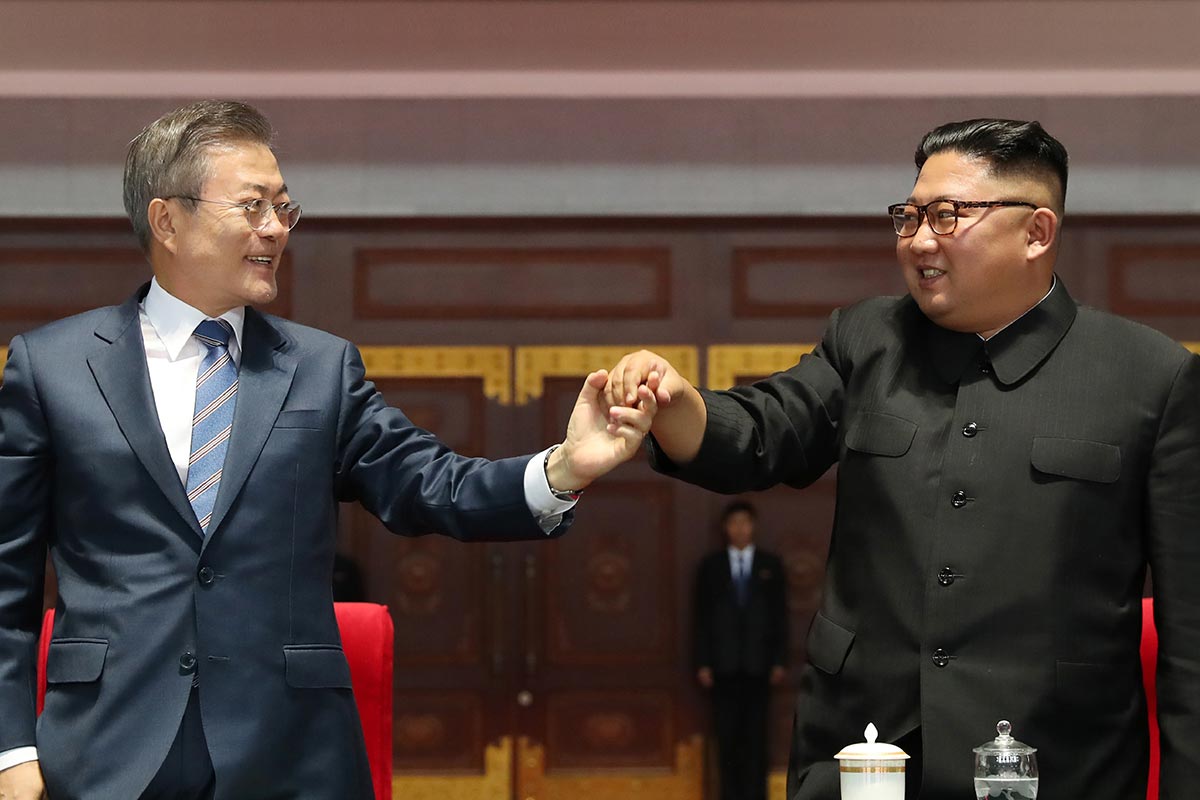North Korea's Kim Jong-un agreed Wednesday to shutter a missile-testing site and visit Seoul, a historic move the United States (US) welcomed by saying it was ready for immediate talks aimed at denuclearising North Korea by January 2021.
Kim's ground-breaking announcement came at a summit with the South's President Moon Jae-in in Pyongyang, where the two signed a document to strengthen ties between the two halves of the divided peninsula.
Progress on the key issue of the North's nuclear arsenal was limited but, building on a growing rapprochement, the two leaders agreed to create a facility to hold family reunions at any time, work towards joining up road and rail links, and mount a combined bid for the 2032 Olympics.
The agreement "carries the people's fresh hope and the people's strong, flaming desire for reunification," Kim said.
Kim's trip to Seoul would be the first by a Northern leader since the end of the 1950-53 Korean War, when hostilities ceased with an armistice rather than a peace treaty, leaving them technically in a state of war.
In their agreement, the North also said it would "permanently close" a missile engine testing site and launch facility in Tongchang-ri "in the presence of experts from relevant nations."
US President Donald Trump welcomed Wednesday's declaration, tweeting that Kim had "agreed to allow nuclear inspections, subject to final negotiations," adding: "Very exciting!"
US Secretary of State Mike Pompeo said he spoke with his North Korean counterpart and invited him to meet in New York next week on the side-lines of the United Nations (UN) General Assembly.
Pompeo praised the "important commitments" made by Pyongyang, adding Washington was ready to "engage immediately in negotiations" to achieve the denuclearisation of North Korea "by January 2021."
Moon, who brokered Kim's historic summit with Trump in Singapore in June, had hoped to bring fresh momentum to stalled talks between his hosts and Washington.
Historic address
Moon later addressed an estimated 150,000 North Koreans at the close of a spectacular propaganda display known as the "Mass Games." He called for the peninsula to reunite after he received a standing ovation from the crowd.
"I propose that we should completely end the past 70 years of hostility and take a big stride of peace to become one again," Moon said according to South Korea's news agency Yonhap.
"Chairman Kim Jong-un and I will make a new fatherland, firmly holding the hands of 80 million Koreans in the South and the North."
In Singapore, Kim declared his backing for denuclearisation of the peninsula but no details were agreed.
Washington and Pyongyang have since sparred over what that means and how it will be achieved - and experts remain sceptical.
The North - whose ballistic missile programme is banned under UN Security Council resolutions - has carried out several long-range rocket launches from the site, also known as Sohae, but has also used many other locations including Pyongyang airport.
Satellite pictures in August suggested workers were already dismantling an engine test stand at Sohae.
"Kim is playing this brilliantly: verify that I dismantle a single site that I no longer need anyway while I mass-produce the missiles the site helped me develop," Vipin Narang of MIT said.
Moon also said the North could close its Yongbyon nuclear plant if Washington takes "corresponding measures" - a significant caveat.
Arms control expert Jeffrey Lewis said the consensus view was that the uranium enrichment facility at Yongbyon "was built for (the) express purpose of being sacrificed."
After the high symbolism of Moon and Kim's first meeting in April in the Demilitarized Zone, and the Singapore summit, progress had largely stalled.
Washington is pressing for the North's "final, fully verified denuclearisation," but Pyongyang has condemned "gangster-like" demands for it to give up its weapons unilaterally.
Ahead of the Pyongyang summit there had been speculation Moon could secure a promise from Kim of a list of the North's nuclear assets, but no such document was mentioned.
"On the denuclearisation issue, the agreement fell short of expectations," Korea University political science professor Yoo Ho-yeol told the media.
Spiritual birthplace
But the two Koreas have been pressing ahead with their own rapprochement, with Kim looking to secure economic cooperation from the far wealthier South, and Moon trying to reduce the risk of a US-North Korean conflict that would devastate his country.
The Rodong Sinmun newspaper - the mouthpiece of the North's ruling party - has carried dozens of photos of the two leaders embracing on Moon's arrival Tuesday, parading together through the streets of the capital, enjoying a concert and toasting at a banquet.
On Wednesday evening Moon's party dined with Kim and his wife at a new fish restaurant in Pyongyang.
It was chosen after Moon expressed interest in dining at a local restaurant with ordinary citizens. However, a retail shop there sells North Korean caviar at US$50 for a 50-gram jar - a luxury far beyond the reach of most North Koreans.
Before returning home on Thursday, Seoul said Moon will travel to Mount Paektu, the spiritual birthplace of the Korean nation on the Chinese-North Korean border. - AFP
